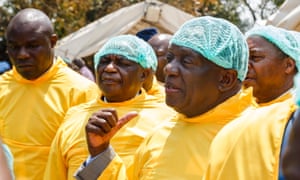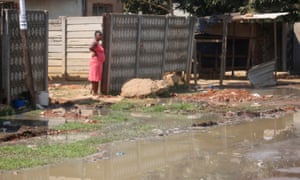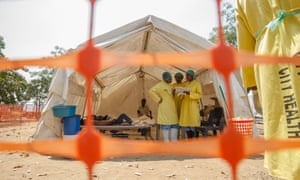Emergency in which 30 people have died shows up appalling infrastructure of Mugabe era
Source: ‘Medieval’ cholera outbreak exposes huge challenges in Zimbabwe | Global development | The Guardian

Authorities in Zimbabwe are struggling to control a deadly cholera outbreak, underlining the enormous challenges that face the country’s new president, Emmerson Mnangagwa.
More than 5,000 people have been infected and 30 killed in the outbreak. A state of emergency has been declared and all public events cancelled, but the disease has nevertheless spread to five of the country’s 10 provinces.
In July, Mnangagwa won Zimbabwe’s first election since Robert Mugabe was ousted by the military last year. Observers criticised the poll, which the opposition claimed was rigged.
The health emergency has shone a light on the appalling state of Zimbabwe’s infrastructure after decades of Mugabe’s autocratic and corrupt rule.
Cholera and related illnesses that cause acute, watery diarrhoea can kill the young, old or ill in hours. A 2008 outbreak in Zimbabwe infected nearly 100,000 people and led to more than 4,000 deaths.

Harare, the capital, has been worst hit in the latest outbreak. It is centred on the poor neighbourhood of Glen View on the outskirts of the city of 2 million people, where drinking water from boreholes has been contaminated by sewage leaking from broken pipes.
“Water has been a problem in this area for years. In the 10 years we have been here nothing has been done. Our lives are in danger,” said Mavis Matayi, a Glen View resident whose husband was in hospital with the disease.
Matayi lives 400 metres from the borehole believed to be the source of the outbreak.
The emergency has overwhelmed Glen View’s main health clinic, which has only 100 beds and limited medical supplies. Tents have been erected to provide extra capacity while NGOs including Unicef and the Zimbabwe Association of Doctors for Human Rights have provided drugs.
Gladys Mukombedzi, a 50-year-old teacher, said she was lucky to survive after being admitted to the overcrowded clinic. “We have lost our dignity … imagine 50 adults in one ward. The government surely must treat us as human beings … things have to change,” she said.
A political row has broken out, with ministers from the ruling Zanu-PF party accusing the opposition Movement for Democratic Change (MDC) of failing to maintain the infrastructure of the city.

The MDC won control of Harare 16 years ago but former officials say the municipality was hit hard when ministers from the ruling Zanu-PF party waived $300m owed by ratepayers shortly before elections in 2013.
“Most of the areas affected have been dealing with an outbreak of typhoid so this is a double punch for them and it shows the weakness of the water systems,” said the Red Cross secretary general, Maxwell Phiri.
The ban on public meetings was announced last week, just as the MDC was preparing to inaugurate its leader, Nelson Chamisa, as the “people’s president”. MDC officials accused the government of abusing the cholera epidemic for political purposes.
The finance minister, Mthuli Ncube, attracted criticism last week when he announced on Twitter that the government was setting up a crowdfunding mechanism to support cholera victims. “Together we can win,” Ncube wrote.
Obadiah Moyo, the newly appointed health minister, said rubbish dumps would be removed from high-risk areas of Harare and sewer pipes repaired. Riot police used water cannon to disperse vendors accused of spreading cholera by selling contaminated food in the centre of Harare.
Community groups criticised the authorities for their lack of preparedness. “It is alarming and quite unusual for such a medieval and preventable disease to continue to claim such valuable lives in this day and age,” said the Civil Society Health Emergency Response Coordinating Committee, a coalition of NGOs, in a statement.

COMMENTS